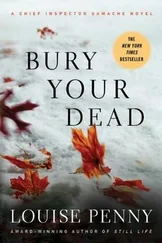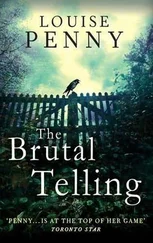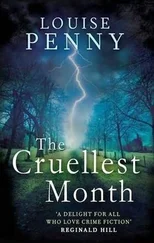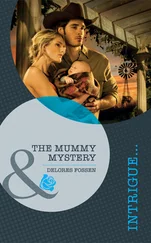What had happened here? Chief Inspector Gamache was asking for his opinion. His educated, thoughtful analysis.
Christ, he prayed. Christ, give me an opinion.
When Inspector Beauvoir had called and asked that one of the local Sûreté officers meet the plane and accompany them to the monastery, Captain Charbonneau had taken the job himself. As head of the detachment he could have assigned anyone. But that was never a consideration.
He wanted it for himself.
And not just to see the inside of the famous abbey.
Captain Charbonneau also wanted to meet Chief Inspector Gamache.
“There’s blood on the grass over there.” Charbonneau waved to a section cordoned off with crime scene tape. “And by the marks on the grass it looks as though he dragged himself a few feet, over here.”
“Or was dragged,” suggested Gamache, “by his killer.”
“Unlikely, patron . There’re no deep footprints on the grass or in the flower bed here.”
“Good,” said Gamache, looking around. “Now why would a dying man drag himself here?”
They all considered the body again. Frère Mathieu was curled into a fetal position, his knees up, his arms wrapped tightly around his stout stomach. His head tucked in. His back was against the stone wall of the garden.
“Was he trying to make himself small?” asked Beauvoir. “He looks like a ball.”
And he did. A quite large black ball that had come to rest against the wall.
“But why?” Gamache asked again. “Why not drag himself toward the monastery? Why move away from it?”
“Maybe he was disoriented,” said Charbonneau. “Was going more on instinct than thought. Maybe there was no reason.”
“Maybe,” said Gamache.
All three continued to stare at the body of Frère Mathieu. Captain Charbonneau glanced across at Gamache, who was deep in thought.
He was inches from the man. Could see all the lines of his face. Both natural and man-made. He could even smell the man. The slightest hint of sandalwood and something else. Rosewater.
He’d seen the Chief Inspector on television, of course. Charbonneau had even flown to Montréal to attend a police conference where Gamache was the keynote speaker. The topic was the Sûreté motto, “Service, Intégrité, Justice.”
That was always the keynote topic and over the years it had become a pep rally, an orgy of self-congratulations to end the annual Sûreté conference.
Except when Chief Inspector Gamache had given the talk, just a few months earlier. At first Gamache had shocked the thousand officers in the audience by talking about his own failings in each of those areas. Where he could have done better. Where he’d failed to do anything at all.
And he made clear the failures of the Sûreté itself. Bringing home with precision and clarity where the police force had let down, even betrayed the trust of the people of Québec. Time and again. It was a merciless indictment of a force Gamache believed in.
And that’s what became clear.
Armand Gamache believed in them. He believed in the Sûreté and in Service and Integrity and Justice.
He could do better.
They could do better.
As individuals and as a force.
By the end of the talk the thousand officers were on their feet, cheering. Revitalized. Inspired.
Except, Captain Charbonneau had noticed, a small cadre. In the front row. They too stood. They too clapped. How could they not? But from his position off to the side, Charbonneau could see their hearts were not in it. And God only knew where their heads were at.
These were the superintendents of the Sûreté. The leadership. And the Minister of Justice.
He wanted now to lean forward. Over the body. To lower his voice and say, “I don’t know why this man crawled away. But I do know something you should hear. You might not have as many friends in the force as you think. As you believe.”
He opened his mouth to speak, but closed it again on looking into the Chief’s face. At the scars, and the deep, intelligent eyes.
This man knows, Charbonneau realized. Chief Inspector Gamache knows his days on the force might be numbered.
“What do you think?” Gamache asked again.
“I think he knew exactly what was going to happen to him.”
“Go on,” said the Chief.
“I think he did his best, but it was too late. He couldn’t get away.”
“No,” agreed Gamache. “There was nowhere to go.”
The two men stared at each other for a moment. Understanding each other.
“But why didn’t he leave a message?” asked Beauvoir.
“I’m sorry?” Charbonneau turned to the younger man.
“Well, he’d seen his killer, he knew he was dying. He had the strength to crawl all this way. Why didn’t he use some of that last energy to leave us a message?” Beauvoir asked.
They looked around, but the earth had been trampled. Not by them, but by a bunch of monks, well meaning or otherwise.
“Maybe it’s simpler than that,” said Charbonneau. “Maybe he was like an animal. Curling up to die alone.”
Gamache felt an overwhelming sympathy for the dead man. To die alone. Almost certainly struck down by someone he knew and trusted. Was that the alarm on this man’s face? Not that he was dying, but that it was at the hands of a brother. Was that how Abel had looked, as he fell to the earth?
They bent over the monk again.
Frère Mathieu was in late middle age, and rotund. A man who didn’t appear to deny himself much. If he mortified his flesh it was with food. And maybe drink. Though he didn’t have the ruddy, bloated complexion of the dissolute.
The prior simply looked well satisfied with his life, though clearly more than a little disappointed by his death.
“Could there have been another blow?” asked the Chief. “To his abdomen, perhaps?”
“… and blessed is the fruit of thy womb…”
Beauvoir also leaned closer and nodded. “His arms are wrapped around his stomach. Do you think he was in pain?”
Gamache stood up and absently brushed dirt from his knees.
“I’ll leave him to you, Inspector. Captain.”
The Chief Inspector retraced his steps, careful not to wander from the path he’d already created.
“ Holy Mary, mother of God …”
The monks continued to repeat the Hail Mary.
How did they know when to stop, Gamache wondered. When was it enough?
He knew what his goal was. To find whoever had killed Frère Mathieu.
“… pray for us sinners …”
But what was theirs, these three black-robed figures?
“… now and at the hour of our death. Amen. ”
FIVE
The Chief watched the monks for a few moments, then he turned and watched Beauvoir.
He’d put on weight, and while still lean he was no longer gaunt. Jean-Guy’s face had filled out and the shadows under his eyes had disappeared.
But more than the physical change, Beauvoir now seemed happy. Indeed, happier than Gamache had ever seen him. Not the feverish, giddy highs of the addict, but a settled calm. Gamache knew it was a long and treacherous road back, but Beauvoir was at least on it.
Gone were the mood swings, the irrational outbursts. The rage and the whining.
Gone were the pills. The OxyContin and Percocet. It was one of the terrible ironies that medications meant to relieve pain would finally cause so much.
God knew, thought Gamache as he watched his Inspector, Beauvoir had had genuine pain. Had needed those pills. But then he’d needed to stop.
And he had. With help. Gamache hoped it wasn’t too soon for his Inspector to be back on the job, but suspected what Beauvoir needed now was normalcy. To not be treated as though he was handicapped.
Читать дальше











